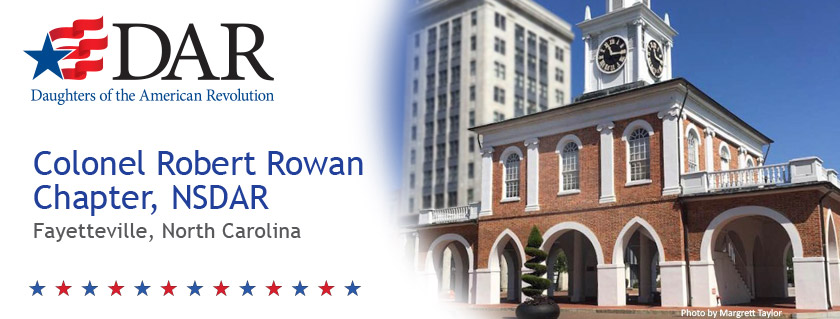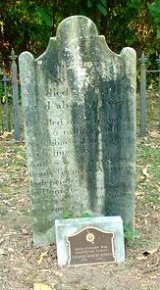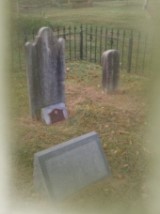Chapter History
The Colonel Robert Rowan Chapter, NSDAR, was established in 1936. The chapter has placed a DAR Historical marker at the gravesite of our namesake Patriot, located in a local historic cemetery.
Located in Fayetteville, North Carolina, we are the home of history, heroes, Fort Bragg, and Pope Air Force Base. It was here on June 20, 1775, that 55 Patriots met at Liberty Point and signed a petition declaring our independence from Great Britain. The city was named in 1783, for the famous Revolutionary War hero Marquis de Lafayette. In 1789, with the legislature meeting here, the U.S. Constitution was ratified and America’s oldest university, the University of North Carolina, was chartered.
On September 1, 1775, the North Carolina Provincial Congress appointed Robert Rowan as a captain under Colonel James Moore in the newly-created 1st North Carolina Regiment, Provincial Troops at that point in time. On November 28, 1775, the Continental Congress accepted this regiment onto the Continental Line. Rowan led his company at the battles of Moores Creek Bridge on February 27, 1776, and the battle of Breach Inlet, South Carolina, on June 28, 1779. Rowan resigned his commission on June 29, 1776.
In 1776, Rowan was a known captain of the local militia under Colonel Ebenezer Folsome in the Cumberland County Regiment Militia. During 1777, Rowan served under Colonel Thomas Matthews in the Cumberland County Regiment Militia. He is known to have quelled a Loyalist uprising at Cross Creek on July 30, 1777, with a company of 40 men.
In April of 1778, Rowan was appointed as the second colonel, alongside Matthews, in the Cumberland County Regiment Militia, replacing Colonel David Smith, who had recently resigned. Rowan soon thereafter resigned in August of 1778, being replaced by Colonel Philip Alston.
When Alston was taken prisoner at the fall of Charlestown, South Carolina, on May 12, 1780, sometime thereafter Rowan was again appointed as the second colonel, alongside Matthews, in the Cumberland County Regiment Militia. He retained this position for most of the remainder of 1780, then Alston was exchanged and returned to active duty.
On or before December 26, 1780, Rowan was appointed Deputy Clothier General for the State of North Carolina, with the rank of colonel. Available records indicate that he retained this position and oftentimes was called on to act as the Superintendent Commissary for the Wilmington District Brigade Militia until the end of the war in 1783. He was also often called upon to lead the Cumberland County Regiment Militia during 1781, when other leaders were incapacitated for various reasons.
Rowan served as a major in the North Carolina Colonial Militia during the French and Indian War. He was the sheriff of Cumberland County from 1770 to 1772, and again in 1777. He was a delegate to the Third Provincial Congress of August 1775, in Hillsborough, and at the Fifth Provincial Congress of November 1776, in Halifax. He was elected to the North Carolina House of Commons in 1778, 1779, and 1785. Rowan was born circa 1738, and he died on October 26, 1798.
The content contained herein does not necessarily represent the position of the NSDAR. Hyperlinks to other sites are not the responsibility of the NSDAR, the state organizations, or individual DAR chapters.


